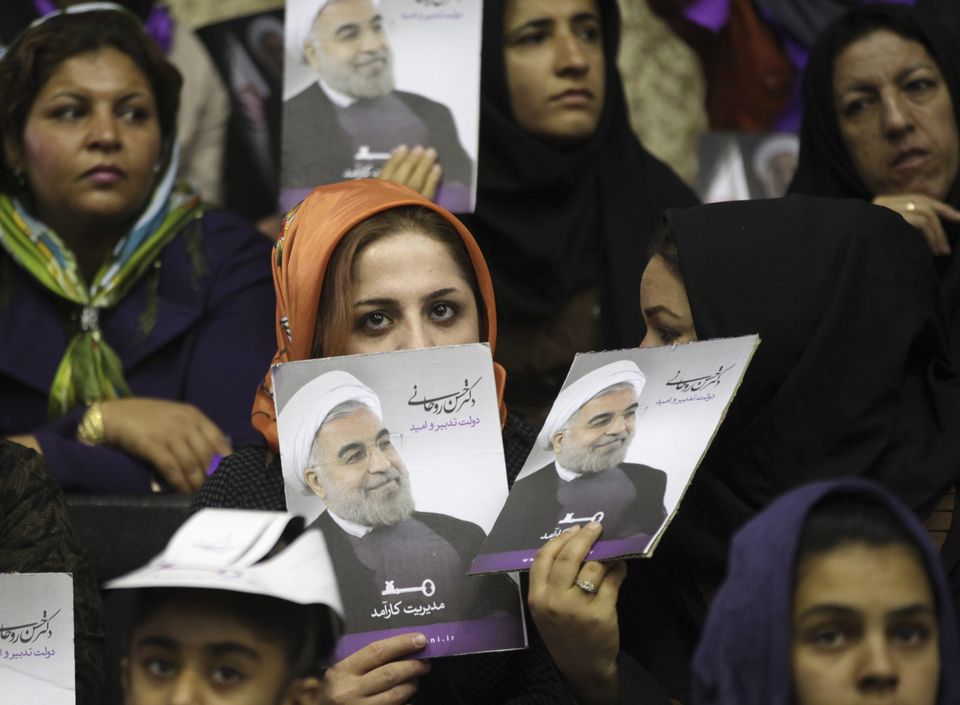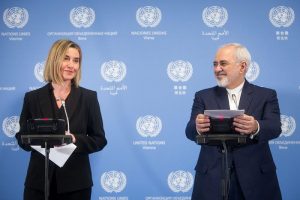No Matter How the Election Turns Out
by Farideh Farhi
The decision by the reformist candidate Mohammadreza Aref to withdraw his candidacy — and in effect open the path for the centrist Hassan Rowhani to become the unified candidate of both the centrists and reformists — is an important development in Iranian politics. Its impact will reach beyond this election.
This isn’t only because the centrist and reformist forces, currently led by former presidents Akbar Hashemi Rafsanjani and Mohammad Khatami, respectively, have done what the conservative forces failed to do. After all, the conservatives — or the array of forces known as the “Principlists” in Iran, also began with the idea of coalition-building in mind. The trio — former foreign minister Ali Akbar Velayati, Tehran mayor Mohmmad Baqer Qalibaf, and former Parliament Speaker Gholamreza Haddad Adel — had agreed that only one of them would stand on Election Day. Today, however, only Haddad Adel has dropped out without specifying his preferred candidate.
Beyond Velayati and Qalibaf, other principlist candidates, including nuclear negotiator Saeed Jalili and former IRGC commander Mohsen Rezaie, remain in the race. So now a splintered principlist field faces a candidate that has the backing of significant political and social forces; a candidate who may, just may, become president if the Iranian electorate decides to vote in larger than expected numbers and, of course, there is no ballot box-tampering.
Just this thought, for me, represents an amazing turn of events in Iran’s ongoing election saga. But even if this form of strategizing does not yield success for whatever reason, the process that led to this alliance is an important one; one that may have a lasting impact on Iranian politics.
Why? Well, first and foremost it was a process that was initially pushed by the rank-and-file and then deliberated upon by a committee of Khatami advisors at the top. In an interview with Mehr News, Ahmad Masjed Jamei, Khatami’s minister of Culture and Islamic Guidance, explained that after Hashemi Rafsanjani’s disqualification most committee members were thinking they would not participate in the election in an organized fashion. Their views, however, changed because “news from the provinces” suggested that people “expected” the reformists to participate and choose one candidate to support in order to increase his chance of winning.
So by creating subcommittees, with identified membership, they began working on different tasks. One subcommittee began talking to candidates as well as well prominent centrists such Hashemi Rafsanjani and former presidential candidate Ali Akbar Nateq Nouri. Another developed an independent mechanism for polling to see which candidate is doing better as he presents himself to the public through state-controlled media as well as campaign rallies. This resulted in the reformist decision to support a candidate who is not explicitly running as a reformist because of his better chances. It took a day or so to convince Aref but once Khatami publicly stepped in and asked him to step aside, Aref did as he had said he would if the reformist leader made the request. Aref is now being declared a man of honor and his word.
And today both Khatami and Hashemi Rafsanjani came out in strong support of Rowhani. Khatami released a video in which he asked people to vote; to create a wave. He said not voting is of no use even in a very flawed electoral system. He shunned idealism and explained why the choice was “rationally” made in the face of the Guardian Council’s disqualification of Hashemi Rafsanjani.
Khatami is usually framed as a timid leader who has a hard time leading. This time around, though, the reluctant leader was moved to action with pressure from below and coordination and advice by a group of aides, all in a rather public and transparent way. There was no guarantee that it would work and in fact many assumed that it would not. But it was tried and led to results.
The message is clear: there is a good sector of the Iranian society that wants the reformists to stay in politics, not by only lamenting what is being done to them, but by actively strategizing to counter the array of tactics and maneuvers that are marshaled to prevent their rightful claim to political power.
This alliance — win or lose — is a declaration that the centrists and reformists are here to stay and cannot be purged. The traditional approach to rejection — which essentially involved going to one’s corner and merely lamenting the unfairness of the electoral process — was not practiced this time, in Masjed Jamei’s words, because of pressure from below, which demanded participation in the competition for power. In both Aref and Rowhani’s rallies, the call for unity was loudly demanded, as was the call for Khatami to lead and help bring about the alliance.
Well, Khatami did it, using a rather deliberate and transparent process that took time and made many rank-and-file reformists nervous. But he, and the process he relied upon, came through with a big bang, allowing him to stand shoulder-to-shoulder with Hashemi Rafsanjani who also said today that even Nateq Nouri, who was the so-called system’s candidate in 1997 and lost to Khatami, will support Rowhani.
Meanwhile, the Guardian Council’s spokesperson, Abbasali Kadkhodai, had a meeting with representatives of the 6 remaining candidates, assuring them that “every vote will be read.” We will have to wait and see. But even if every vote is read, Rowhani’s success is not guaranteed if reformist and centrist voters — the most disaffected voters after what happened in the 2009 election — do not come out and vote.
In any case, an example of what successful politics on the part of those seeking change in Iran can look like was just put on display for future reference.





